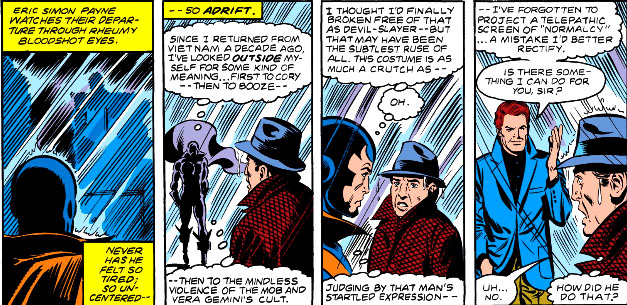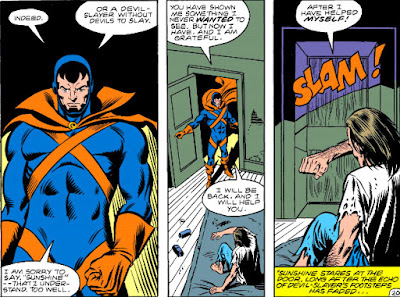Following the events of their 100th issue, the Defenders return home a demoralized lot, having lost their friend and comrade, Daimon Hellstrom, to the pits of Hades. And in spite of the fact that they saved Earth from the ravages of Satan, perhaps worse than having to leave Hellstrom behind is the knowledge that it was their actions, in part, which brought about his fate.
But try telling all that to the Hulk, whose words hang in the air as if to underscore their collective guilt.
Yet while all of the other Defenders feel a sense of loss, perhaps the one who feels it most profoundly is Patsy Walker, a/k/a the Hellcat--and so the Hulk's words impact on her harshly, causing her to snap and lose her temper while confusing the behemoth even further with her pain-filled response. And while she relents and apologizes, the Hulk rejects it and leaves in a huff.
Nor is he alone--though the Sub-Mariner's parting words are more reserved, if blunt.
Also departing is Nighthawk, who is now without the use of his legs during the day and has renounced his place in the Defenders. And Eric Simon Payne, the Devil-Slayer? Having faced the ultimate array of devils, where does he go from here? He stands in contrast to Dr. Strange, whose sense of failure is in its own way just as gnawing as Patsy's.
The rousing words of Isaac Christians, the Gargoyle, become the catalyst for the Defenders picking themselves up from this traumatic event and taking the first steps on the road to recovery--steps which writer J.M. DeMatteis dedicates this entire issue to pursuing, which will hopefully bring about what its cover proclaims.
At the urging of Isaac, it's Patsy who decides to take the first of those steps (while accompanied by the Valkyrie and Isaac), by visiting her housekeeper, Dolly Donahue, who's currently hospitalized. Right behind them, following suit, are Strange, his disciple and lover, Clea, and the Silver Surfer, characters whose journey together will no doubt be diverting.
It's not exactly a surprise to see Payne, the more solitary among them, prefer to remain behind on his own; as it turns out, his is the more intriguing path taken, since his nature makes him the most volatile of the group (aside from Hellstrom and the Hulk), as well as the most suspicious of others. How does such a man reconnect with life--with purpose--when the paths he's taken have proven to be futile?
The answer takes the ironic form of the one thing Payne has learned to be on guard against: the unexpected.
Despite the meaningful scenes on the way which will feature the other Defenders, Payne's encounter with Ira Gross--"Sunshine"--has already done a fair job of capturing our attention, given that it's the complete opposite of the theme of affirmation which we might have been expecting this issue to embrace. It's clear that it's certainly not the encounter that Sunshine expected.
Over at the hospital, the mood is considerably lighter as Dolly receives her friends, while making a new acquaintance who's the personification of "shock and awe." Yet Dolly's upbeat state of mind becomes an inadvertent reminder of the loss Patsy is struggling to live with.
With this being the children's ward, however, the chances are favorable that Patsy might be distracted from her anguish by offering comfort to one of the patients whose prognosis is uncertain, though she finds her new friend's outlook on life couldn't be brighter.
DeMatteis perhaps pours it on a bit thick here with the child's sunny and admittedly saccharine disposition; cancer treatment can be a grueling experience even under the best circumstances, yet Serina trivializes her condition and her stays in the hospital as if it's all part of a wondrous fairy tale. How much more the scene might have resonated if, instead, DeMatteis had shown Patsy, despite her depression, digging deep inside herself to find the words to offer Serina which might have given her a fresh outlook on life, one that Patsy herself could benefit from.
When we pivot to the Surfer, Clea, and Strange, they also find their spirits lifted when they visit with an African tribe which had months ago welcomed the Surfer with open arms--a rare thing indeed, given the belligerent treatment and deception he's suffered from his contacts with other initially friendly strangers (our old friend Calizuma and his buddies, for example). Yet this time, happily, things turned out differently for him. And while the Surfer obviously responds to the warmth of his hosts, Strange and Clea find a connection with them on a spiritual level which sends them soaring, as well.
It's clearly been a breakthrough for the Surfer, who under other writers could see only the darker side of the human race--capable of greatness, but seemingly forever mired in their fear, avarice, and hatred. It's fair to wonder if this new perspective will sustain him--or if there will continue to be times when he shuns humans and lumps them all into one category. Will he still believe that love and sanctity can be found "in every heart"?
As for Payne, it's not certain what either he or Sunshine brings to the other's table--until, that is, they make their way to Sunshine's dwelling (for want of a better word), and Payne discovers that Sunshine's life, in certain respects, mirrors his own.
Which brings us full circle, as Payne arrives back at Strange's sanctum near dawn the next day, and all of them bask in a happy ending that none of these souls had expected to find for themselves.
It's understandable that DeMatteis arranged to have both the Hulk and Namor make their exits quickly from this story and thus be excluded from these excursions; unless on his own when he encounters others (a good example would be Jim Wilson, or Crackajack Jackson), the Hulk would likely have been uncomfortable in any of these situations (it's really Bruce Banner who could use the renewal), while Namor appeared to take the loss of Hellstrom in stride. But why exclude Kyle Richmond? He may not be teammates with these others anymore, but they're still his friends--and he could have benefitted from a visit to that hospital, where he could see how children who are less fortunate than even himself managed to hold onto hope and not succumb to sadness or isolation.
 | The Defenders #101 Script: J.M. DeMatteis Pencils: Don Perlin Inks: Joe Sinnott Letterer: Shelly Leferman |
























3 comments:
I spy a mistake on that cover - Defenders #101 is from November 1981 but in the corner-box it says 1980 Marvel Comics Group. Tut tut.
Beautiful Sinnott inks making pedestrian Perlin pencils shine.
I agree with you in part, Marcus, though honestly I'm not sure how I'd categorize Perlin's work. He has a very stiff style that could use some technique in natural movement, motion, and flexibility, but I wouldn't exactly call his work lacking in inspiration; in fact, there are several good panels of storytelling in this issue that I thought were clever and nicely adapted by DeMatteis. That said, I can sympathize with those who might feel his work is unexciting to a certain degree.
Post a Comment